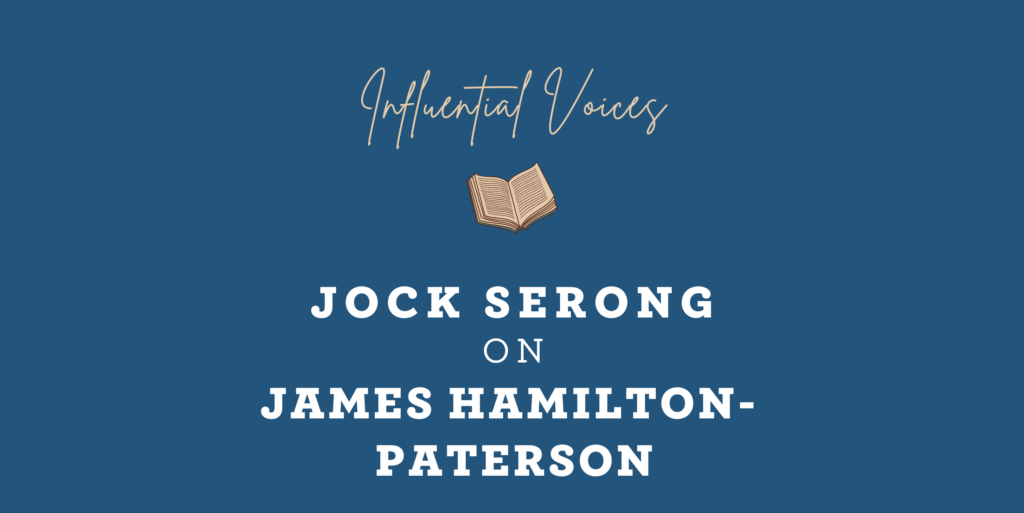
In 1994, I walked into Alice’s Bookshop in North Carlton, a bored and restless final-year law student. Moments later I walked out with a used paperback in my hand, and my life changed forever.
The book was Seven Tenths: The Sea and its Thresholds, by James Hamilton-Paterson. Published in 1992, it attracted little fanfare, principally because its author was a recluse who refused to do publicity. His Wikipedia entry offers a link to an official website. The link is broken, and that pleases me.
Hamilton-Paterson was born in England to doctor parents, notably a neurologist father who was remote and constantly exhausted. Their relationship was difficult. James became a wanderer, and has spent the majority of his life in Tuscany, Austria and the Philippines — specifically, in a hut in the Marinduque jungle beside a lagoon and a coral reef. He was a hospital orderly, a teacher, a musician. Horrifyingly, he was raped by a pack of men in Libya, and later wrote of the experience. He writes of many things, always with a piercing melancholy that is extremely hard to describe. He never married nor fathered children, and has few close friends. But he is said to be wonderful company, a witty and combative conversationalist.
Seven Tenths is a meditation on the ocean, a book that answered questions that were troubling me in my 20s. The book, like the writer and his style, evades definition, but it weaves together science and history, literature and music, mythology and dreams and more, to establish a deep human connection to the sea; one we cannot ever understand but are obliged to re-enact, down through the centuries. In some ways, also, it is a book about drowning.
It gave form to an ache I felt. I grew up in the suburbs and my prospects were safe there: they housed my family and all of my friends. But I was desperate to spend my days in, and on, and near to, the ocean. The ways I expressed the longing — surfing, or fishing or diving — were mere symptoms, he taught me. The actual causes were as deep as the human soul.
I left the city. I returned, tried the desert, fled to the coast again. I’m still there now. The death knell to my legal career, my final capitulation to the lure of the sea, was my involvement in a magazine project called Great Ocean Quarterly; a journal that was an attempt to collect the artistic manifestations of that same obsession: photography, writing, art. In my first editorial for GOQ, I wrote about Hamilton-Paterson and his book, and I hunted down his email address to tell him what I was doing, and how he’d altered the course of my life. He wrote back, brief but friendly. His words were shot through with that same melancholy, focused in 2013 on his sadness that the darkest ecological predictions in his 1992 book had come to pass — and worse — as the world ignored his words.
Hamilton-Paterson has also written for magazines. He’s written extensively about the Philippines, and has crafted beautiful poems and novels, most notably the eerie and lyrical Gerontius and Griefwork, neither of which is centrally concerned with the sea. If one of his contributions to my life was an encouragement to salt-seeking nomadism, the other was a lifelong suspicion of publicity-seekers. He is a loner who writes not for fame, but because he needs to. He made it alright to believe in something ethereal about the ocean, something divine and inexplicable that defied both cliché and evidence. With his strange and unsettling prose, he whispered the terrifying possibility, straight-faced, that you could sacrifice your rational life to it.
My copy of Seven Tenths is ragged now. The spine is broken and the pages fall out: it’s held together with rubber bands. There is a passage in there about ageing: he tells of a ritual of his: he would row a small boat out from his home in the Philippine jungle, across the lagoon to the fringing reef, where the coral plunges away into the blue-black of the fathomless ocean. (Elsewhere in the book, he calls depth ‘time’s liquid correlative’, a perfect instance of his ability to merge physics and mysticism.)
He’d moor the boat and dive overboard holding a small rock, spearing down beside the cliff of the reef until his lungs could take no more, then drop the rock and return to the surface. As he aged, he wrote, he noticed he was letting go of the rock sooner and sooner. He could measure his physical decline by the inhabitants of the reef, peering back at him. He would be 78 now, out there somewhere, living in exquisite literary exile.
About the Writer
More from Writing NSW
Check out our full range of in-person writing courses in Sydney, our online writing courses and our feedback programs to see how we can help you on your writing journey. Find out about our prizes and opportunities, as well as writing groups across NSW, and sign up to our weekly newsletter for writing events, opportunities and giveaways.
